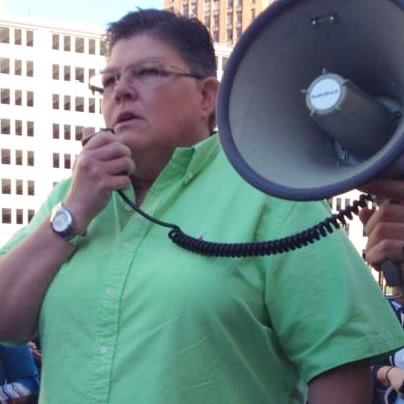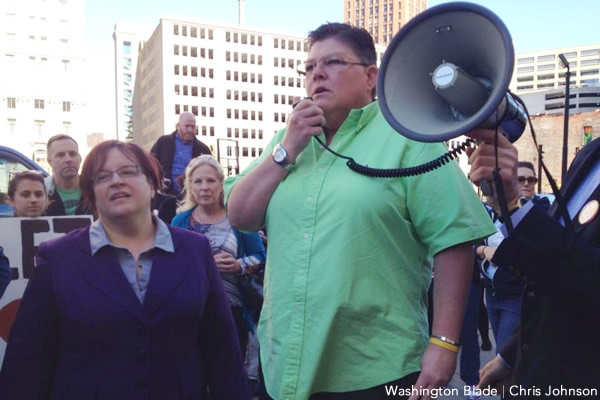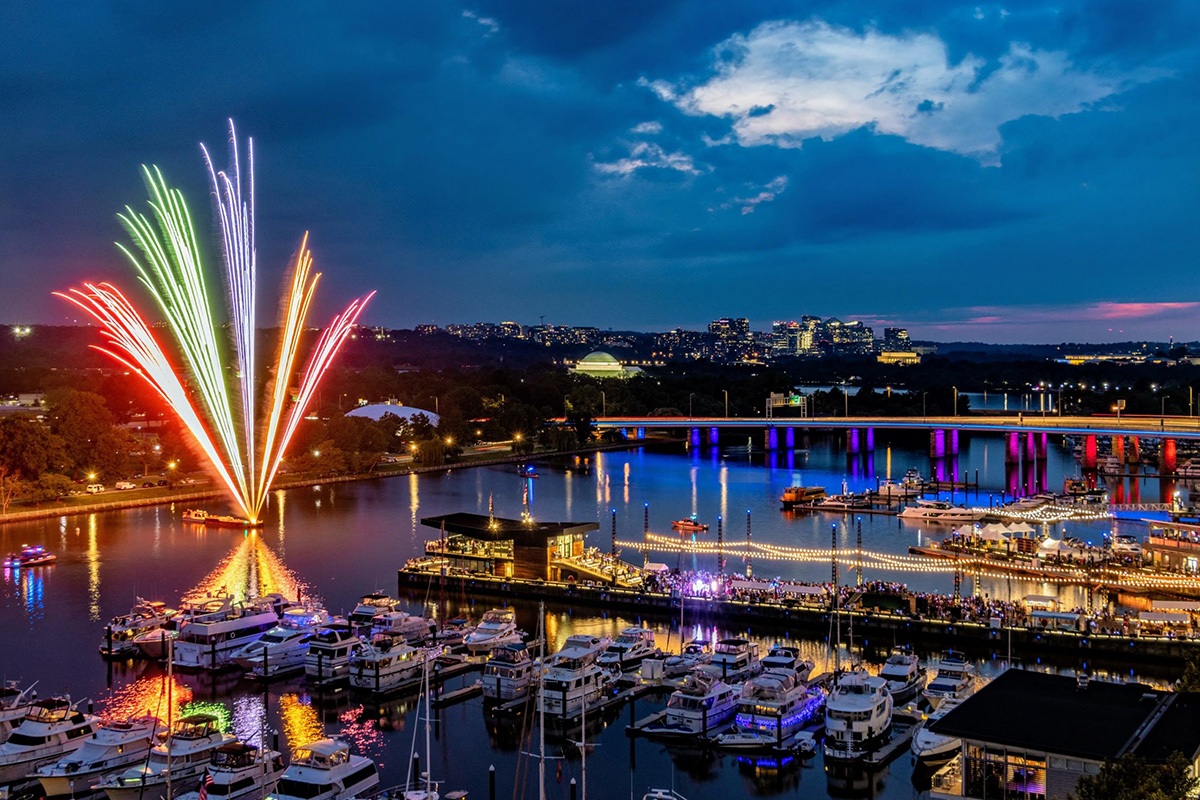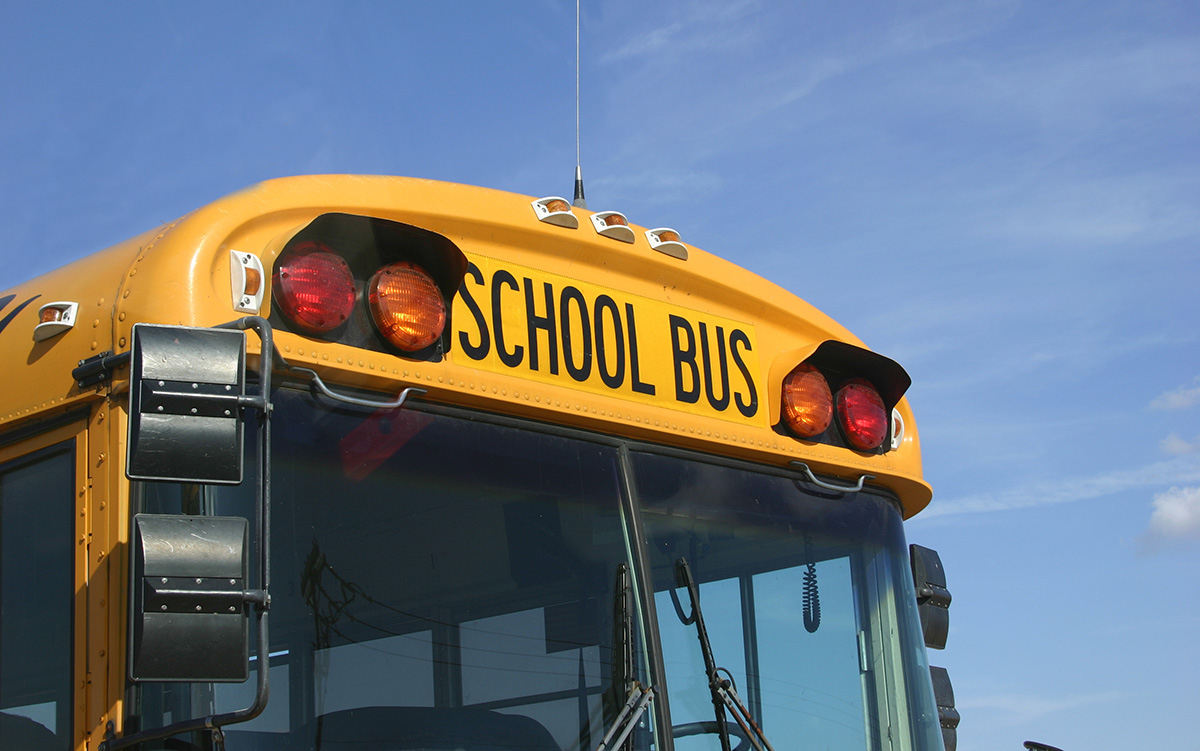News
Court strikes down Michigan marriage ban
Judge delivers ruling following two-week trial on prohibition of gay nuptials


April DeBoer (on left) and Jayne Rowse filed the lawsuit against Michigan’s ban on same-sex marriage (Washington Blade file photo by Chris Johnson).
A federal court in Michigan made the latest in a series of rulings in favor of marriage equality by striking down the Wolverine State’s constitutional ban on same-sex marriage.
In a 31-page ruling, U.S. District Judge Bernard Friedman, a Reagan appointee, ruled on Friday the state’s prohibition on gay nuptials violated the equal protection clause under the Fourteenth Amendment of the U.S. Constitution.
“After reviewing the evidence presented at the trial, including the testimony of various expert witnesses, the exhibits, and stipulations, and after considering all of the legal issues involved, the Court concludes that the MMA is unconstitutional and will enjoin its enforcement,” Friedman writes.
Michigan’s ban on same-sex marriage, known as Michigan Proposal 04-2, was approved as part of the state constitution by 59 percent of Michigan voters in 2004.
Friedman devotes a considerable portion of his decision to the ban’s impact on same-sex couples and the children they raise, drawing on language used by U.S. Associate Justice Anthony Kennedy in his ruling against the Defense of Marriage Act.
“In attempting to define this case as a challenge to ‘the will of the people,’ state defendants lost sight of what this case is truly about: people,” Friedman writes. “No court record of this proceeding could ever fully convey the personal sacrifice of these two plaintiffs who seek to ensure that the state may no longer impair the rights of their children and the thousands of others now being raised by same-sex couples.”
Nowhere does the ruling mention a stay on the decision. Rana Elmire, a spokesperson for the ACLU of Michigan, said her organization believes same-sex couples can marry immediately in the state.
Although Elmire initially said clerks’ offices are reopening to marry couples in the wake of the ruling, the ACLU of Michigan later tweeted that it can’t confirm reports that clerks offices are re-opening
Two of the clerk’s offices for the more populous counties in Michigan — Washtenaw and Oakland — were already closed when the ruling was handed down and had no one answering calls when the Blade contacted them to see if they would reopen. Ingham County Clerk Barb Byrum, was present when the ruling was handed down, but said her office would remain closed until Monday at 8 am.
But according to a tweet from Gongwer News Service, the Washtenaw County clerk’s office will be open at 9 am on Saturday to distribute marriage licenses.
Washtenaw County Clerk to open between 9 a.m. and 1 p.m. Saturday to offer marriage licenses in wake of #gaymarriage ruling.
— Gongwer News Service (@GongwerMichigan) March 22, 2014
Shannon Minter, legal director for the National Center for Lesbian Rights, also said he believes same-sex couples can marry at once in Michigan — as long as clerk’s offices are open.
“I am not sure if any city halls or clerk’s offices are open over the weekend, but if so, then marriages could take place immediately,” Minter said.
Michigan has a three-day waiting period after obtaining a license and being able to wed, but that waiting period can be waived for an additional fee that varies between county to county.
Now that the district has ruled against the state’s ban on same-sex marriage, state officials — Michigan Gov. Rick Snyder and Attorney General Bill Schuette, who have been defending the law in court — have the option to appeal to the decision to the U.S. Sixth Circuit Court of Appeals.
Immediately after the ruling, Schuette filed a notice of appeal with the court, saying he and Snyder “hereby appeal” the case to the appellate court. All four states within the Sixth Circuit — Michigan, Tennessee, Ohio and Kentucky — now have marriage equality cases before the appeals court.
Schuette said in a statement after the ruling that he has filed an emergency request for a stay and an appeal of the decision. Both were filed before the Sixth Circuit late Friday.
“In 2004 the citizens of Michigan recognized that diversity in parenting is best for kids and families because moms and dads are not interchangeable,” Schuette said. “Michigan voters enshrined that decision in our State constitution, and their will should stand and be respected. I will continue to carry out my duty to protect and defend the Constitution.”
The ruling is the latest in a string of decisions from federal courts against bans on same-sex marriage in states such as Utah, Oklahoma, Virginia and Texas following the U.S. Supreme Court’s decision against the Defense of Marriage Act. According to Lambda Legal, the decision is the 14th decision in a row from a court striking down a state ban on same-sex marriage after the DOMA decision.
But the decision in Michigan case is the first of the post-DOMA decisions handed down after a trial.
For two weeks, Friedman heard testimony from trial from various witnesses on the constitutionality of Michigan’s ban on same-sex marriage. Among the witnesses the state presented was Mark Regenrus, the author of a widely discredited study denigrating parenting by same-sex couples.
As Think Progress notes, on the witness stand, Regnerus admitted on the witness that he doesn’t know whether excluding same-sex couples from marriage has any impact on the children they raise.
Friedman criticizes the testimony from Regnerus during the trial, saying the court finds his study “entirely unbelievable and not worthy of serious consideration.”
“Whatever Regnerus may have found in this ‘study,’ he certainly cannot purport to have undertaken a scholarly research effort to compare the outcomes of children raised by same-sex couples with those of children raised by heterosexual couples,” Friedman writes. “It is no wonder that the NFSS has been widely and severely criticized by other scholars, and that Regnerus’s own sociology department at the University of Texas has distanced itself from the NFSS in particular and Dr. Regnerus’s views in general and reaffirmed the aforementioned APA position statement.”
The case, DeBoer v. Snyder, was filed by private attorneys in January 2012 on behalf of April DeBoer and Jayne Rowse, a lesbian couple in Hazel Park, Mich., who were seeking the ability to jointly adopt their three children. The couple amended their case early last year to seek marriage equality in Michigan, while still pursuing their goal of adoption rights.
As recorded by local TV affiliate WXYZ, DeBoer and Rowze embraced each other and their children with joy after one of their attorneys, Dana Nessel, read aloud the ruling to them.
LGBT advocates praised Friedman for striking down the ban on same-sex marriage and said it’s evidence a nationwide ruling in favor of marriage equality is within reach.
Jay Kaplan, a staff attorney for the ACLU of Michigan, said the lawsuit at its core was about “protecting Michigan families.”
“We are thrilled that the court found that there is no reason to deny loving, committed same-sex couples and their families the protections that come with marriage,” Kaplan said. “By doing so, the court has underscored the American value that freedom is for everyone.”
Evan Wolfson, president of Freedom to Marry, said the win for same-sex couples in Michigan comes after opponents couldn’t identify a single reason why they shouldn’t be able to marry.
“Today’s win comes after a full trial — complete with prosecutors and defendants, witness cross-examinations, and testimony from family experts on the well-being of children — which showed that opponents have nothing more than the same bogus claims they have recycled for decades,” Wolfson said. “They were simply unable to provide a single legitimate reason why committed same-sex couples should be excluded from marriage. Michigan, like all of America, is ready for the freedom to marry.”
District of Columbia
LGBTQ budget advocates fight for D.C. resources in a tough fiscal year
‘Trying to preserve life-saving services’ amid $1 billion cut

The months and days leading up to June are especially busy for LGBTQ Washingtonians. For one group, the DC LGBT Budget Coalition, which works year-round to ensure LGBTQ residents are represented and financially supported by the D.C. government, this time of year is their Super Bowl. Beginning in April, the D.C. Council and Mayor’s Office hold budget hearings for the next fiscal year.
With D.C.’s budget now under review, the Washington Blade spoke with Heidi Ellis, coordinator of the DC LGBT Budget Coalition, about the group’s top priorities and their push to ensure continued support for queer communities.
“The LGBTQ Budget Coalition was founded in 2020 at the height of the pandemic, as a way for the community to work together to advocate for key funding and policy changes,” Ellis said. “We recognized we were stronger together. A lot of groups are often pitted against each other for resources and dollars. This coalition was founded out of a need for unity. Since then, we’ve successfully advocated for more than $20 million in dedicated LGBTQ investments.”
In addition to coordinating the coalition, Ellis is the founder and CEO of HME Consulting & Advocacy, a firm that helps build coalitions and advance policy initiatives that address intersectional issues in the LGBTQ community. One of its most powerful tools, she explained, is direct outreach through community surveys.
“We actually do community surveys to see what people need and what’s top of mind,” Ellis said. “Of course, we also pay attention to the broader political landscape — like the current threats to HIV funding. That helps us prioritize.”
Because the coalition is comprised of more than 20 organizations across various sectors —healthcare, housing, community organizing — Ellis said its diversity enables it to connect grassroots needs to potential policy solutions.
“Our coalition includes service providers, community groups, health and housing advocates-folks who are deeply plugged into what’s happening on the ground,” she said. “They help determine our direction. We know we don’t represent every queer person in D.C., but our coalition reflects a wide range of identities and experiences.”
The insights gathered through those surveys ultimately inform the coalition’s annual budget proposal, which is submitted to the Council and mayor.
“That’s how we got to our FY26 priorities,” she said. “This year, more than ever, we’re fighting to protect what we’ve already secured — funding and policies we’ve had to fight for in the past. We know there’s concern around this budget.”
One of the challenges this year is that the D.C. government’s operating budget and some of its legislation must be approved by Congress. With a projected decline in tax revenue and a Republican-controlled Congress that has historically opposed LGBTQ funding, the Coalition has had to think strategically.
“Even before the situation on the Hill, the CFO projected lower revenue,” Ellis said. “That meant cuts to social programs were already coming. And now, with the $1 billion slashed from D.C.’s budget due to the continuing resolution, we’re not only fighting for D.C.’s budget and autonomy, but also trying to preserve life-saving services. Our message is simple: Don’t forget about queer people.”
This year’s proposal doesn’t include specific dollar figures. Instead, the Coalition outlines five funding priority areas: Healthcare, Employment & Economic Equity, Housing, Safety & Community Support, and Civil Rights.
Why no exact amounts? Ellis said it’s because not all solutions are financial.
“Some of our asks don’t require new funding. Others build on existing programs-we’re asking whether the current use of funds is the most effective. We’re also proposing policy changes that wouldn’t cost extra but could make a real difference. It’s about using what we have better,” she said.
When drafting the proposal, the Coalition tries to prioritize those with the most pressing and intersecting needs.
“Our perspective is: If we advocate for the most vulnerable, others benefit too,” Ellis said. “Take LGBTQ seniors. Some may have done well in life but now face housing insecurity or struggle to access affordable healthcare. Many in our coalition are elders who fought on the frontlines during the AIDS epidemic. They bring critical historical context and remind us that Black and brown communities bore the brunt of that crisis.”
“I love our coalition because it keeps us accountable to the moment,” she added. “If we center those most marginalized, we can make an impact that lifts everyone.”
In addition to healthcare and housing, safety remains a top concern. The Coalition has fought to maintain funding for the Violence Prevention and Response Team (VPART), a city-supported group that includes MPD, community-based organizations, and the Mayor’s Office of LGBTQ Affairs. VPART responds to crimes affecting the LGBTQ community and connects victims to legal, healthcare, and housing services.
“We’ve pushed to make VPART more proactive, not just reactive,” Ellis said. “The funding we’ve secured has helped survivors get the support they need. Cutting that funding now would undo progress we’re just beginning to see.”
At the end of the day, Ellis emphasized that this process is about far more than spreadsheets.
“A budget is a moral document,” she said. “If we’re not represented, you’re telling us our lives don’t matter at a time when we need protection the most. When people can’t get food, medicine, housing — that has a devastating impact. These are vital services.”
The DC LGBT Budget Coalition is urging residents to support a letter-writing campaign to D.C. Council members and the mayor. You can send a letter here: https://actionnetwork.org/letters/fully-fund-dcs-lgbtq-communities
Read the full FY26 budget proposal here: https://drive.google.com/file/d/1bTrENnc4ZazJTO6LPrQ3lZkF02QNIIf1/view
Arts & Entertainment
Washington Blade’s Pride on the Pier returns bigger than ever with two-day WorldPride celebration

The Washington Blade’s Pride on the Pier will be extended to a two-day celebration in honor of WorldPride coming to D.C. this year. Taking place on Friday, June 6 and Saturday, June 7 at The Wharf, this year’s event promises more entertainment, more community, and more pride than ever before — all set against the stunning waterfront backdrop of our nation’s capital.
With the addition of Friday, the party kicks off at 3 p.m., with the inaugural WorldPride Boat Parade at 7 p.m. As an Official WorldPride Partner event, the boat parade will feature 30 decorated boats parading along the Washington Channel. For information on signing up for the boat parade contact Stephen Rutgers at [email protected].
Saturday’s signature Pier Party kicks off at 12 p.m., featuring a drag show, DJ’s, streaming of the WorldPride Parade, and the iconic Fireworks Show Presented by the Leonard-Litz Foundation — one of D.C. Pride’s most anticipated spectacles.
“We’re expanding Washington Blade Pride on the Pier to reflect the excitement and momentum building for WorldPride in D.C.,” said Blade publisher Lynne Brown. “It’s a celebration of our community’s progress and a powerful reminder of the joy and visibility Pride brings to the heart of our city.”
Now in its seventh year, Washington Blade Pride on the Pier extends the city’s annual celebration of LGBTQ visibility to the bustling Wharf waterfront with an exciting array of activities and entertainment for all ages. The District Pier will offer DJs, dancing, drag, and other entertainment. Alcoholic beverages will be available for purchase for those 21 and older.
Pride on the Pier is free and open to the public, with VIP tickets available for exclusive pier access, hosted bars, and private viewing areas for the boat parade and the fireworks show. To purchase VIP tickets visit www.prideonthepierdc.com/vip.
Friday VIP: 5-9 p.m., enjoy an air-conditioned lounge, private bathroom, cash bar and complimentary drink.
Saturday VIP Session #1: 2-5 p.m., enjoy an air-conditioned lounge, private bathroom, catered food, and an open bar.
Saturday VIP Session #2: 6-9 p.m., enjoy the air-conditioned lounge, private bathroom, catered snacks and dinner, and open bar with a front-row view of the fireworks.
Event Details:
📍 Location: District Pier at The Wharf (101 District Sq., S.W., Washington, D.C.)
📅 Dates: Friday, June 6 & Saturday, June 7, 2025
🛥️Boat Parade: 7 p.m. (June 6). 🎆 Fireworks Show: 9 p.m. (June 7)
🎟️ VIP Tickets: www.PrideOnThePierDC.com/VIP
Event sponsors include Absolut, Capital Pride, DC Fray, Infinate Legacy, Heineken, Leonard-Litz Foundation, Mayor’s Office of LGBTQ Affairs, Relish Catering, Washingtonian, and The Wharf. More information regarding activities will be released at www.PrideOnThePierDC.com
Maryland
Md. schools plan to comply with federal DEI demands
Superintendents opt for cooperation over confrontation

By LIZ BOWIE | Deciding not to pick a fight with the Trump administration, Maryland school leaders plan to sign a letter to the U.S. Department of Education that says their school districts are complying with all civil rights laws.
The two-paragraph letter could deflect a confrontation over whether the state’s public schools run diversity, equity, and inclusion programs that the Trump administration has called illegal. The Baltimore Banner reviewed the letter, which was shared by a school administrator who declined to be identified because the letter has not yet been sent.
Maryland school leaders are taking a more conciliatory approach than those in some other states. Education leaders in Minnesota, New York, Colorado, Oregon, Vermont, and Wisconsin said they will not comply with the federal education department’s order, the demands of which, they say, are based on a warped interpretation of civil rights law.
The rest of this article can be found on the Baltimore Banner’s website.
-

 Opinions5 days ago
Opinions5 days agoIt’s time for new leadership on the Maryland LGBTQIA+ Commission
-

 The White House5 days ago
The White House5 days agoWhite House does not ‘respond’ to reporters’ requests with pronouns included
-

 Arts & Entertainment5 days ago
Arts & Entertainment5 days ago‘Gay is Good’ Pride Pils Can Celebrates Frank Kameny’s 100th Birthday for WorldPride in D.C.
-

 Sponsored5 days ago
Sponsored5 days agoTHC Drinks: What You Should Know About Cannabis Beverages












